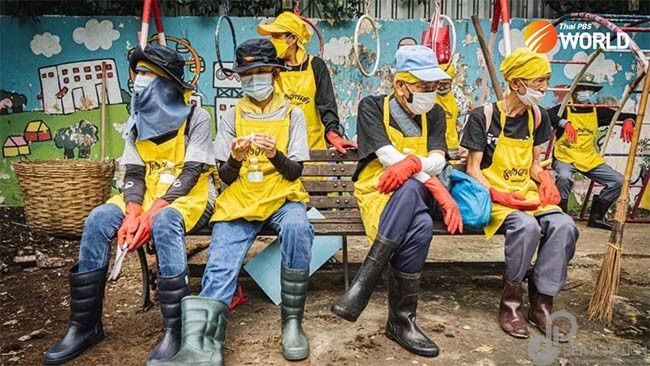 The median age in Thailand currently stands at 40 years and two months, far older than the world average of 30 years and five months. This startling fact suggests that if Thailand fails to take action now, it could rapidly be overwhelmed by problems related to its aging society.
The median age in Thailand currently stands at 40 years and two months, far older than the world average of 30 years and five months. This startling fact suggests that if Thailand fails to take action now, it could rapidly be overwhelmed by problems related to its aging society.
Thailand’s population is on course to shrink by at least 50% by 2100, according to the Social Development and Human Security Ministry.
“I believe Thai governments both past and present have been aware of this fact. But I don’t know if the [incoming] government will introduce clear-cut or radical policies to address this situation,” said Professor Teera Sindecharak, who lectures at Thammasat University’s Sociology and Anthropology Faculty.

Professor Teera Sindecharak
Economic and social impacts
Teera warns that the ongoing demographic trend could mean that infrastructure designed to serve huge numbers of people will soon be left half-empty. And businesses may find it difficult to attract enough customers or staff to continue operating.
“Every sector will be affected, from nurseries to schools to universities to big corporations,” he said. “Big investments in mega infrastructure projects may be wasted because they end up serving a much smaller number of users.”
The trend will also see extended families becoming replaced by smaller nuclear family units, he added. Generation gaps will become bigger because people nowadays tend to marry at an older age compared with previous generations. More people will also live alone, while maintaining ties with friends and distant relatives. More couples who get married may decide not to have children because they cherish their freedom and independence.
“Technology will likely play an even bigger role in people’s lives,” Teera continued. “Some people will likely turn to the virtual world for social interaction as there will be fewer people around them, fewer relatives or in-laws.”
He said the shrinking population could also lead to social problems, economic difficulties and even national security issues.
Thailand’s population situation
Thailand’s population stands at 66 million people, but at least 20% of citizens are over 60 and this is expected to grow to 30% by 2036.
This current year also marks the first time when the number of people aged 20 to 24 entering the workforce is lower than the number of people retiring, or those aged 60 to 64.
The birthrate in Thailand has been dropping for several decades. Mahidol University’s Institute for Population and Social Research reports that half a century ago, each woman in Thailand gave birth to an average of just over five children.
However, the average fertility rate has plummeted over the past few decades, dropping to 2.2 births per woman in 1991 and just 1.1 births in 2021. As such, the number of babies born in Thailand has crashed. More than a million babies were born in Thailand every year between 1963 and 1983. But last year, the number was as low as 502,107 babies.
It is notable that 2021 saw the number of deaths overtake births for the first time ever in Thailand.
Policy recommendations
Dr Boonyarit Sukrat, who heads the Bureau of Reproductive Health, said that to restore a healthy population balance, Thailand must look beyond the birthrate and embrace foreign migrants.
“Importing good quality migrant workers is one possible solution.”
Boonyarit wants the government to establish systems and measures to combat the dangers presented by its shrinking population. These systems and measures, he said, should foster inclusivity, equality and non-discrimination. “Nobody should be left behind,” he said.
Boonyarit added that the Health Department is already encouraging Thais to get married and have children via various promotional activities aimed at helping the younger generation take a positive attitude toward starting a family.
“We have also made policy recommendations to the government,” he said.
Thailand will likely need to import more foreign professionals, immigrants, refugees and migrant workers to answer demands in its labor market, according to a press conference titled “Policy Reframing: Replacement Migration” held last week by Mahidol University’s Institute for Population and Social Research.
It recommended that the government grant Thai nationality to about 200,000 qualified foreigners every year. Achieving that goal would allow Thailand to compensate for half of the drop in population numbers, the institute said.
“We don’t need foreigners for 100% replacement yet, because we can tackle the population shift with other measures as well,” said Prof Dr Aphichat Chamratrithirong, senior advisor at the institute.

Prof Dr Aphichat Chamratrithirong
Other measures would include developing a quality elderly society, upgrading human resources, extending the retirement age, and replacing humans with technology in the workplace.
Thammasat lecturer Teera agreed, adding that authorities should ensure that couples who want to have children get the support to fulfil this desire. Meanwhile, people who do not want or cannot have children should also be taught how to properly prepare for living in their retirement alone.
“Those who are yet to make up their minds should be offered comprehensive information so they can make informed decisions,” Teera said.
Consequences of poor policies
Critics say Thailand is in demographic crisis because of a lack of policies to support people to start a family.
Currently, parents have the right to 90 days of paternity/maternity leave and a payment of 13,000 baht per birth. Couples with children also get tax benefits, while parents under the Social Development and Human Security Ministry’s scheme receive monthly support of 600 baht per child up to the age of six.
Still, when compared with developed nations, these measures seem neither tempting nor practical.
In Singapore, parents are granted 8,000 Singapore dollars (about 207,000 baht) for their first and second child, and 10,000 Singapore dollars for their third child.
In the Czech Republic, parents can take extended time off at partial salary – two years off at half pay and a third year at 33% – to care for their babies.
New government, new hope?
Thailand’s new ruling party, Pheu Thai, has clear policies on boosting the birthrate, said Teera. For instance, the party has pledged to provide better welfare to new parents in the form of childbirth allowances, longer leave, and more generous child support subsidies. It has also offered to help with assisted reproductive technology to address infertility.
By Thai PBS World’s General Desk
Source : https://www.thaipbsworld.com/does-crashing-birthrate-and-aging-society-spell-doom-for-thailand/


